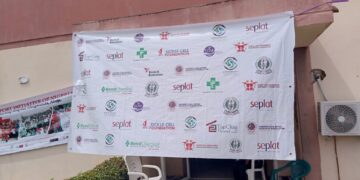The Universal Basic Education Commission UBEC had given more attention to capacity building, particularly in it’s drive to sustain the Basic Education in the 774 local government areas across the country, and the six area councils in the Federal Capital Territory FCT, Abuja.
This goes beyond the in-house training for staffs , program implementors and administrative managers, as well as policy makers of the commission, but for those on the field, charged with the day to day runnings and management of Basic Education in Nigeria.
Therefore, the issue of constant training and retrainings of the managers and administrators of Basic Education handlers cannot be overlooked or emphasised, considering the dynamics and unforeseen circumstances sorrounding the administration of Education policies in the country.
Also, for effective implementation of policies and programs of the Universal Basic Education Commission UBEC , constant and routine programs that involve the critical stakeholders with series of training and workshop was a corrolary.
For the effectiveness of schools designated under Basic Education, Education managers like Education Secretaries (ES) across the 36 states and local governments including the FCT, were been trained by the commission to sustain the tempo of improvement and positive development of Basic Education in Nigeria.
Because of it’s role in the implementation of Basic Education, UBEC had prioritized effective school management via the ES and trickled down to class teachers as needful, across the North and Southern part of the country.
It emphaised that through constant training exercise,the managers will inturn improve not only schools enrollment, but input of pupils to quality Education as an enduring legacy of the commission.
This had ensured an improved school age children enrollment, deployment of quality Basic Education, via capacity building for teachers, implementation of Basic knowledge and solid foundation.
Aside administration of schools, trainings of pupils regularly imparted on the schools managers like the Education Secretaries, (ES) , the commission also embarked on wholistic training for the teachers in Basic schools, routinely in psychosocial support skills, to prepare them ahead of any eventualities and unforeseen circumstances, particularly the crises areas and crises prone areas.
The commission in it’s wisdom embarked on overall training of teachers in crises areas, setting aside 13 states designated as crises rideen and prone, to manage children in these areas and emergencies, and by extension their parents.
The states spread across 13 identified states of Katsina, Yobe, Borno , Taraba, Ebonyi, Rivers, Benue, Niger, Nassarawa, Oyo , Plateau, Zamfara and Adamawa was engaged in the new areas of training to avoid school age children not ostracized from the scheme of beneficiaries of Basic Education in the country, not minding the emergencies.
The traumatized children of school age in these areas due to various crises experienced in their communities, became averse to assessing Basic Education in the areas.
The proactive decisions of the commission by training about 100 teachers in each of the 13 states amounting to 1,300 teachers spread across Basic schools, deflated the unpredictable scenario of crises that had been unabated.
The counter action and positive reaction of the commission under the leadership of Dr Hamid Bobboyi had reduced to the barest minimum, the negative believe and apathy of pupils and parents towards inculcating basic knowledge and Education in the flash point states.
The program which was made possible with the production of manual Handbook developed by the communities in collaboration with the international partners i.e. UNICEF, USAID and public institutions and individuals among many others.
The approach introduced and coordinated by the commission had placed Basic Education at high pedestal and at similar stead with relatively peaceful areas.
Having discovered the new area of capacity enhancement and building, the commission had deployed it to reverse the negative effects of out of school children (OOSC) , in the vulnerable areas.
Yusuf, Is A Public Affairs Analyst, Writes from Abuja on yus.abubakar3@gmail.com















